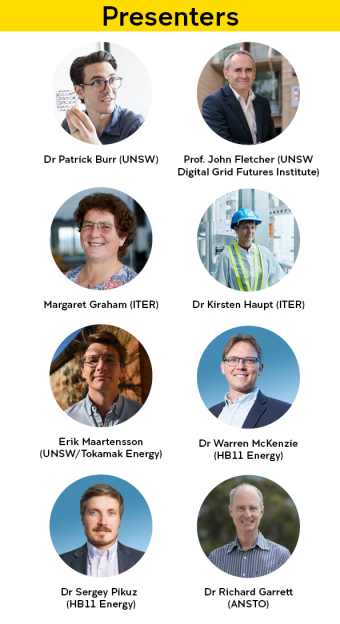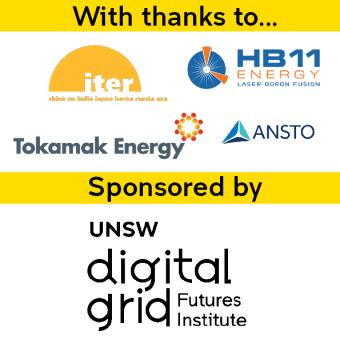Register for this event via Eventbrite.
Join us for our two-day Introduction to Fusion Energy course! Perfect for students interested in fusion, with a particular focus on technology, engineering, and innovation. This short introductory course will feature lectures, activities, and workshops that will help you explore how fusion energy is relevant to your professional development and discover future career pathways.
Fusion energy is a rapidly emerging innovation, but those with relevant degrees currently have limited knowledge and skills available on the subject in Australia. UNSW Digital Grid Futures Institute is sponsoring this short course as part of their mission to enable the electrification of society for a smart, sustainable future.
The cost of tickets has been subsidised by UNSW Digital Grid Futures Institute and UNSW Students can participate free of charge - but hurry, tickets are limited and will sell out fast!
If you are a non-UNSW student and want to be considered for a registration fee waiver, please email digitalgridfutures@unsw.edu.au with a brief (maximum 250 words) explanation of why you wish to join the course and await a response before purchasing tickets.
About
The fusion industry is experiencing rapid growth, with an estimated value expected to reach nearly US$1 trillion by 2040. Fusion energy has transitioned from a scientific curiosity to a tangible engineering solution for decarbonising electricity production. However, there are engineering challenges that need to be overcome. This two-day introductory course is the first of its kind in Australasia. It aims to provide students with a comprehensive understanding of fusion energy technology, its underlying principles, and its innovative approaches. Participants will learn how they can contribute and thrive in this expanding industry.
This short course focusses on fusion technology with an emphasis on practical applications and engineering challenges, rather than fundamental physics. Renowned experts from private fusion energy companies, international government organisations, national research laboratories and academia will share their insights and experiences. Each day will include a combination of lectures, workshops, and opportunities to connect with professionals from both industry and academia. Additionally, the course will mark the launch of the new UNSW AtomCraft VIP, offering students the chance to design, build, operate, and refine the world’s first student-built fusion machine.
Participants will receive a certificate of completion at the conclusion of the course.
Who it’s for
This course is designed for individuals interested in fusion energy, with a particular focus on technology and engineering. However, it is suitable for anyone with a passion for science. Examples of degree programs that may find this introductory course helpful include, but are not limited to:
- Mechanical Engineering
- Electrical Engineering
- Physics
- Materials Science and Engineering
- Computer Science and Engineering
- Civil Engineering
- Nuclear Engineering
- Engineering for Sustainable Energy
- Mechatronics Engineering
- Chemical Engineering
- Chemistry
- Quantum Engineering
By participating in Introduction to Fusion Technology, attendees will gain valuable insights into fusion energy technology and its potential impact on the future of clean energy production.
Key topics
The two-day introductory course will cover a range of compelling topics. Here are some examples of what participants can expect:
Principles of fusion energy: Delve into the fundamental concepts and principles behind fusion energy, gaining a solid understanding of its scientific basis.
Different approaches to fusion energy technology: Explore various approaches to achieving fusion energy, such as magnetic confinement, inertial confinement, and laser confinement. Gain insights into the strengths and challenges associated with each approach.
Case studies: Learn from real-world examples through engaging case studies presented by private companies, international governmental organizations, and national research laboratories. Discover their innovative work and the advancements they have made in the field of fusion energy.
Lectures on innovation in fusion energy: Attend thought-provoking lectures that explore the cutting-edge innovations in fusion energy. Gain insights into the latest developments, research trends, and breakthroughs shaping the future of this exciting field.
Workshops: Participate in interactive workshops designed to stimulate creativity and problem-solving. Design your own tokamak, a fusion device, and develop a fusion roadmap, envisioning the steps and strategies required for successful fusion energy implementation.
Networking opportunities: Connect with professionals from industry and academia, fostering valuable relationships and expanding your network. Engage in meaningful conversations, exchange ideas, and gain insights from experts actively involved in fusion energy research and development.
The diverse range of topics covered aims to provide attendees with a comprehensive understanding of fusion energy, its technological aspects, and its potential for revolutionising the future of sustainable energy production.
Register for this event via Eventbrite

